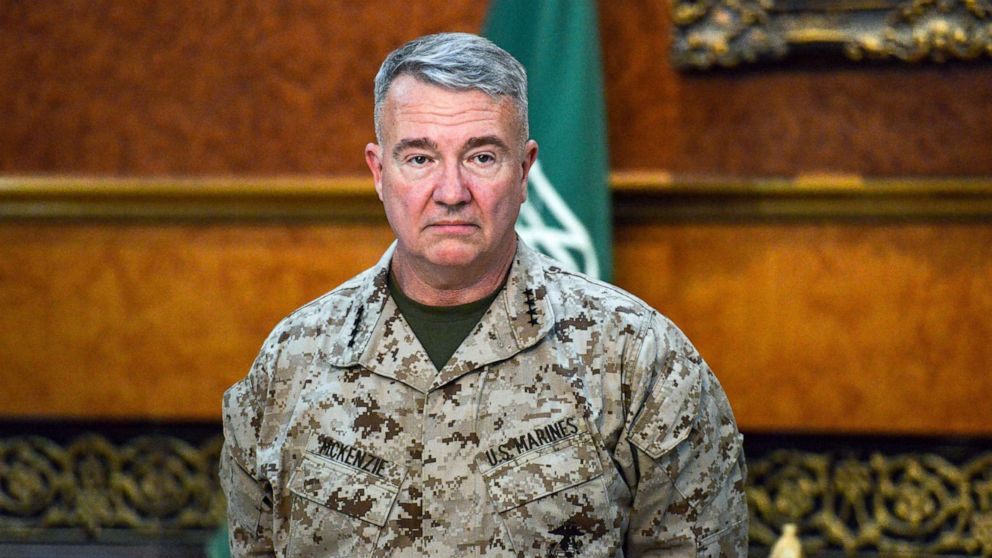McKenzie says the United States is not looking for an escalation.
With the anniversary of the U.S. drone attack that killed a major Iranian general approaching, there remains a “high risk” of an Iranian threat to American interests in the Middle East, the top US general in the Middle East told ABC News in an interview . But General Kenneth “Frank” McKenzie also downplayed that a conflict between the United States and Iran is more likely.
McKenzie made his comments a day after the U.S. Navy gave the rare recognition that a U.S. submarine had entered the Persian Gulf, a move widely seen as sending a message to Iran.
The head of the US Central Command spoke with ABC News on the way back to the United States from a trip to the Middle East that included stopovers in Iraq, Syria and Afghanistan.
American officials fear that Iran or the proxy groups it supports in the region may retaliate for the January 3 American drone attack that killed the Revolutionary Guard commander, General Qassem Soleimani, in Baghdad.
McKenzie recently told reporters that US intelligence saw an increased risk of an attack inside Iraq by Iran or by Iranian-supported groups
“I believe we are still at a high risk period,” McKenzie told ABC News on Tuesday. “I would just like to emphasize this key point: we are not looking for an escalation. We are not looking for a war with Iran, I really want to emphasize that.”
McKenzie continues to see Iran and its representatives as the greatest threat to US interests in the region, but, he said, “It is my belief that Iran does not want a war with the United States now.”
“And I know for sure that the United States does not want war with Iran,” he added.
On Monday, the US Navy made a point of publicly publicizing the transit of the submarine USS Georgia in the Persian Gulf, a move widely seen as sending a message to Iran not to increase tensions.
McKenzie did not give an explanation for the deployment of the submarine in the Gulf, except that “there are a number of reasons for bringing a submarine straight to the Persian Gulf. I will not comment on that further.”
And he noted that when a submarine crosses the Strait of Hormuz, “it will be on the surface”.
“Then you can take what you want,” he said.
The threat to US troops and interests in Iraq generally takes the form of rocket attacks by Iran-backed Shi’ite militias targeting the US embassy in Baghdad, although these attacks have recently stabilized.
But on Sunday night, unknown attackers fired 20 107 mm rockets at the embassy complex, killing an Iraqi civilian. No American was injured in the attack, which damaged some structures in the complex.
“The launch of more than 20 rockets at the United States Embassy is certainly an escalation,” said McKenzie, who also called the attack “very worrying”, since it was the biggest attack since 2010.
“We take this very seriously,” said McKenzie. “We pass on our concern to the Iraqi government. We are there at your invitation; they have a responsibility to protect us and, in fact, I believe they take this very seriously.”
The investigation to determine who was responsible for the attack continues, and with so many rockets fired, McKenzie predicted that “there will be a lot of evidence”.
An assessment is also underway to determine whether the C-RAM air defense system has played a role in minimizing damage and casualties in the attack.
The rocket attack occurred 12 hours after McKenzie left Iraq, after meetings with the Iraqi defense chief. McKenzie remained optimistic that an agreement will be reached with Iraq to maintain a long-term American military presence in the country.
The United States is in the process of reducing the number of forces in Iraq and Afghanistan to 2,500 in mid-January.
The reduction of troops in Afghanistan means that there are more NATO forces than US soldiers in Afghanistan, and McKenzie hoped that this would continue, even though NATO is likely to decide to reduce its troop levels early next year.
McKenzie said the United States could continue to carry out its counterterrorism and advisory missions in Afghanistan, although these operations “are not as robust as we were in the past”.
The Taliban stopped attacking US forces in Afghanistan as part of the peace agreement reached with the United States earlier this year. But McKenzie remains concerned about the “very high” number of Taliban attacks on Afghan security forces.
He expressed optimism that the Afghan government and Taliban negotiators will be able to deal with the levels of violence when they resume peace talks in Qatar on 5 January.
